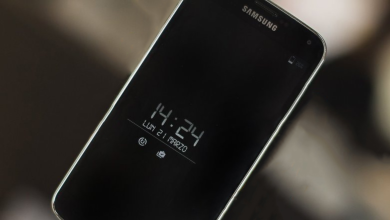Fix: Samsung Pay not Working
The Samsung Pay application may not work if you are using an outdated version or because of bad misconfigurations of different phone settings (like power saving mode, battery optimization, screen resolution, NFC, etc.).
The issue arises when the user tries to make a payment through the Samsung Pay but the transaction fails at a “get started” or “device not supported” screen (with a spinning blue and green circle) even with fingerprint or PIN. In many cases, the issue started after an OS update. Nearly all models of Samsung phones are reported to be affected. The issue is reported on nearly all POS systems/terminals.
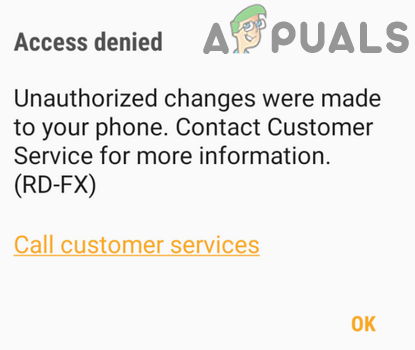
Before moving on with the solutions, restart your phone. Moreover, when making the payment through the Samsung Pay, first put in your PIN and then pay through the phone. Also, try to make the payment without any case or cover of your phone (if using). Additionally, check your battery level as usually the Samsung Pay will not work below 5% battery (in some rare cases, the Samsung Pay did not work when the battery was below 70%).
Furthermore, disable/enable fingerprint verification (or re-add your fingerprints) in the Samsung Pay to rule out any temporary glitch. Also, make sure you are using a single SIM (of a Samsung Pay supported country) on your phone. When making the payment, let the cashier select Debit when asked for a payment option. Last but not the least, check if the region of your phone (CSC) is supported for Samsung Pay (regardless it is being used in a supported country).
Solution 1: Update the Samsung Pay Application to the Latest Build
The Samsung Pay is regularly updated to add new features and patch known bugs. Samsung Pay may not work if you are using an obsolete version of the Samsung Pay application because it can create compatibility issues between the application and OS modules. In this scenario, updating the Samsung Pay to the latest build may solve the problem.
- Launch Google Play Store and tap on the Hamburger menu (near the top left of the screen).
- Now select My Apps & Games and navigate to the Installed tab.

My apps & games – PlayStore - Then select Samsung Pay and tap on the Update button (if an update is available).

Update the Samsung Pay Application - After updating the application, check if Samsung Pay is working fine.
- If not, then launch the Galaxy Apps Store and click on 3 dots (near the top right of the screen).
- Now, select My Apps and then tap on Updates.
- Then check if Samsung Pay is clear of the error.
Solution 2: Disable Power Saving Mode of Your Phone
Power saving mode is quite helpful in extending the battery standby time of your phone. But this mode has its share of issues as it limits the operation of many background processes (including Samsung Pay) and thus causes the current Samsung Pay issue. In this context, disabling the power saving mode of your phone may solve the problem.
- Swipe down from the top of the screen of your phone to open the Notifications tray.
- Now, under the option of Battery Saver is on, tap on Turn off Battery Saver.
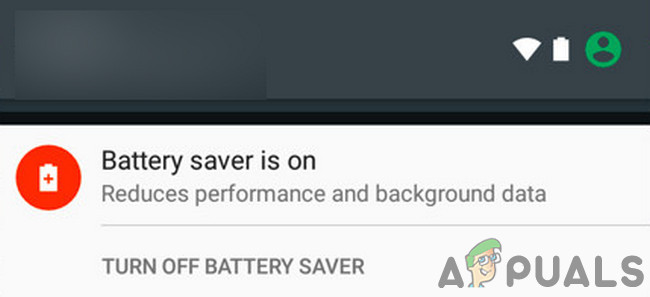
Turn Off Battery Saver - Then check if Samsung Pay is operating normally.
- If not, launch the Settings of your phone and open Device Care.
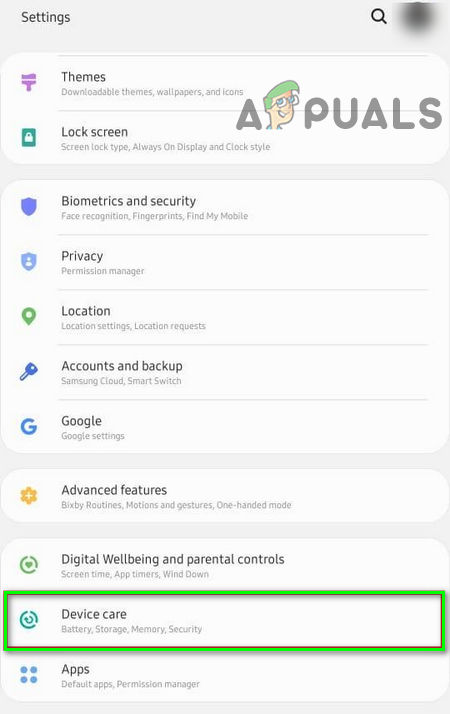
Open Device Care - Now, select Battery and then tap on Power Mode.
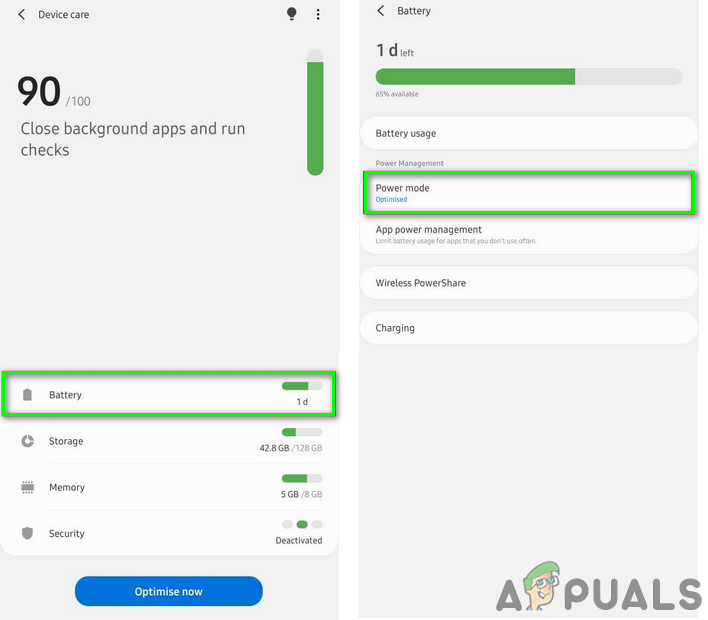
Open Power Mode of Your Phone - Now, change the power mode to High Performance and then check if Samsung Pay is clear of the error.
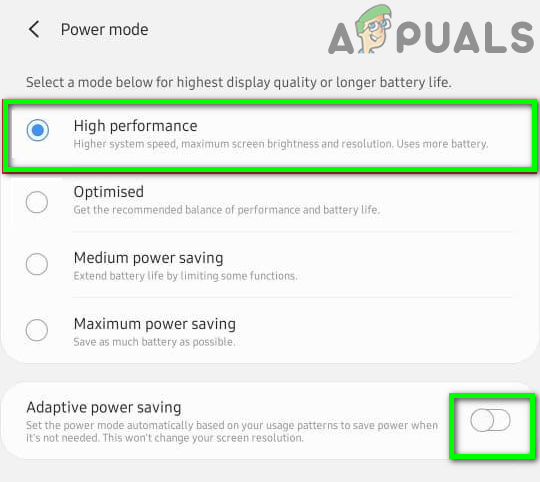
Enable High-Performance Mode and Disable Adaptive Power Saving
Solution 3: Disable Battery Optimization for Samsung Pay
The battery optimization feature is quite helpful in extending the battery time of your phone. But this feature limits the operation of many applications/processes including Samsung pay and thus causes the error at hand. In this case, disabling the Battery Optimization for Samsung Pay may solve the problem.
- Launch the Settings of your smartphone and open Device Care.
- Now select Battery and tap on Battery Usage.
- Then tap on the More button (3 vertical ellipses near the top right corner of the screen) and then select Optimize Battery Usage.
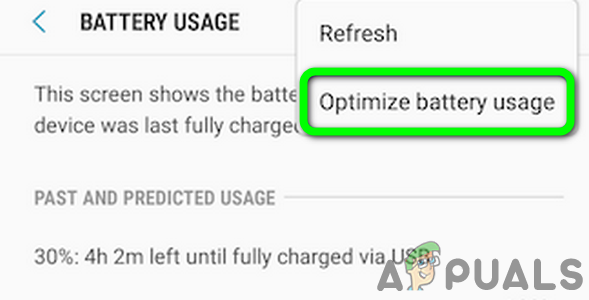
Optimize Battery Usage - Now disable battery optimization for Samsung Pay.
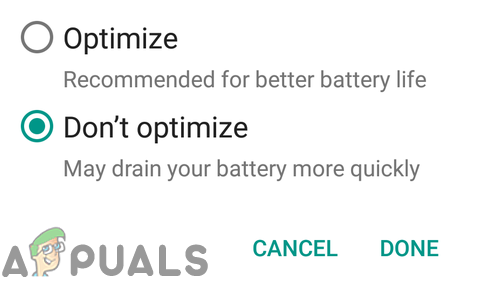
Don’t Optimize Battery for Samsung Pay - Then relaunch the Samsung Pay and check if it is operating fine.
- If not, then launch the Settings of your phone and select Connections.
- Now, tap on NFC and then open Tap & Pay.
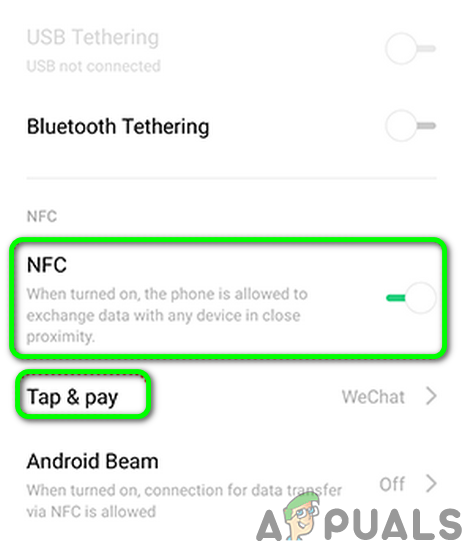
Select Tap & Pay - Then set Samsung Pay as the default and check if the Samsung Pay is clear of the error.
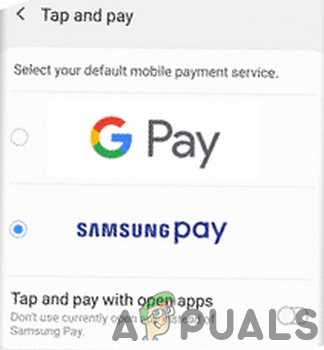
Select Samsung Pay as the Default Tap & Pay
Solution 4: Change Screen Resolution of Your Phone
Samsung Pay might not work properly if the screen resolution of your phone is set lower than that is essential (FHD+) for the operation of the Samsung Pay application. In this scenario, increasing the screen resolution of your phone may solve the problem. This method may not apply to all the affected users.
- Launch the Settings of your phone and open Display.

Open Display In the Phone’s Settings - Now select Screen Resolution and then change the slider to increase the screen resolution (FHD+ or WQHD+) of your phone.
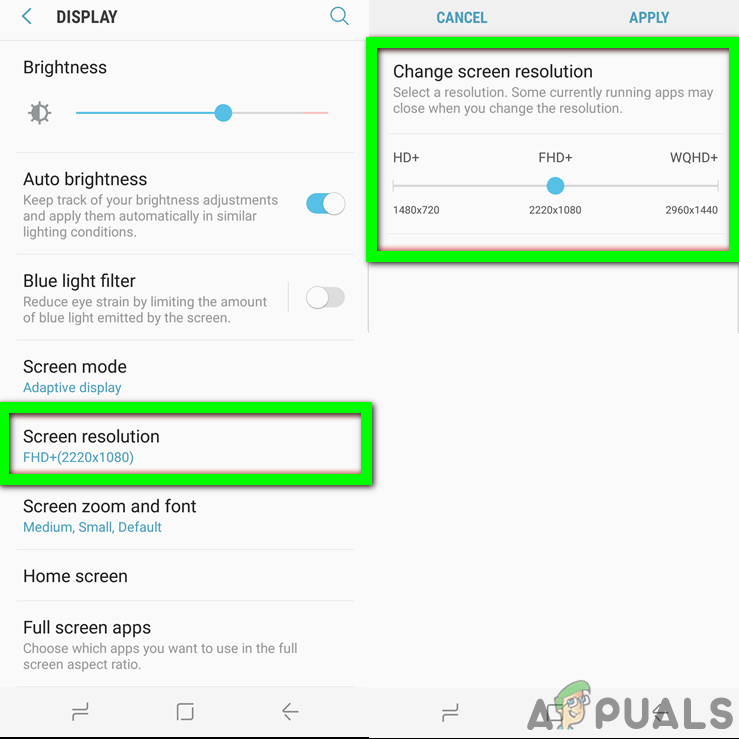
Change Screen Resolution of Your Phone - Then launch the Samsung Pay and check if it is clear of the error.
Solution 5: Enable Embedded Secure Element in the NFC Settings
An embedded secure element is essential for the NFC based operation of Samsung Pay. You may encounter the error at hand if the Embedded Secure Element is disabled in the NFC settings of your phone. Here, simply enabling the Embedded Secure Element in the NFC settings of your phone may solve the problem.
- Launch the Settings of your phone and open Connections.
- Now tap on NFC & Payment and then open Menu.
- Now tap on the Default NFC Method and then enable the option of Embedded Secure Element. If your phone does not have the option of Embedded Secure Element, then you cannot use Samsung Pay on your phone.
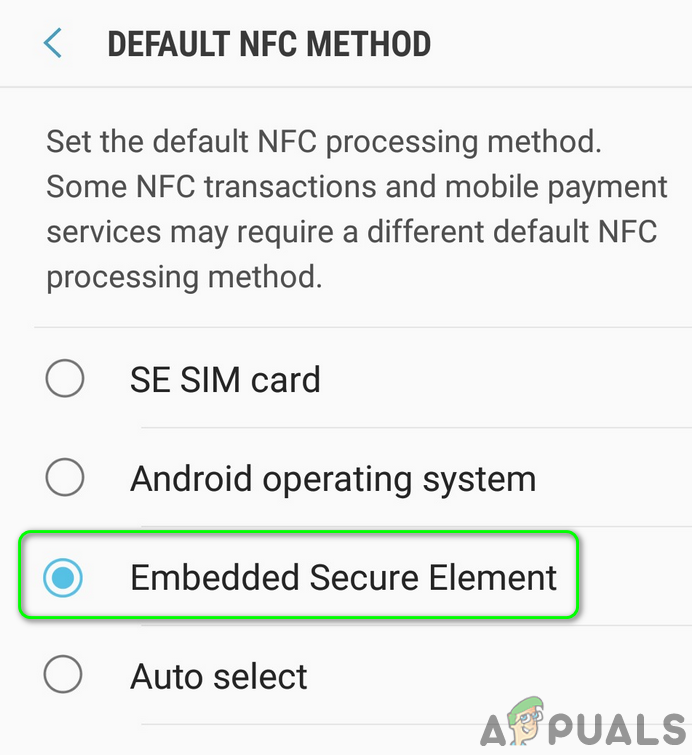
Enable Embedded Secure Element - Then check if Samsung Pay is working fine.
Solution 6: Read a Physical Credit/Debit Card
The Samsung Pay issue could be a result of a temporary bug in the payment modules of the Samsung Pay application. The glitch can be cleared by re-adding any of the physical cards.
- Launch the Samsung Pay and select the appropriate card.
- Now tap on Delete Card (near the top right of the screen) and enter your PIN to delete the card.

Delete Card From Samsung Pay - Now relaunch the Samsung Pay and open its Menu (near the top left corner of the screen).
- Then select Cards and tap on Add Cards.
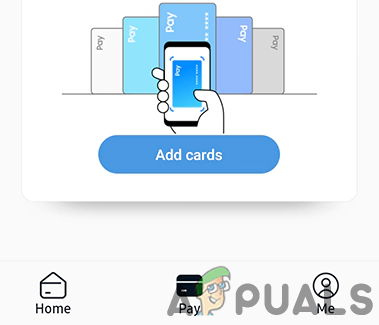
Add Cards to Samsung Pay - Now tap on Add Debit/Credit Card and follow the instructions on your screen to add the card.
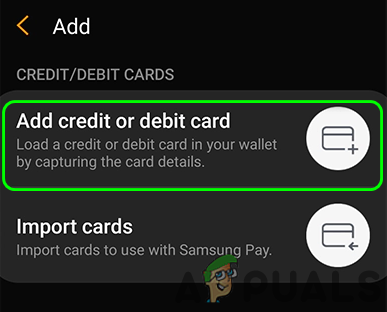
Add Credit/Debit Card to Samsung Pay - After adding the card, check if Samsung Pay is operating fine.
- If not, relaunch the Samsung Pay and open its Menu.
- Now, open Settings and then select Manage Favorite Cards.
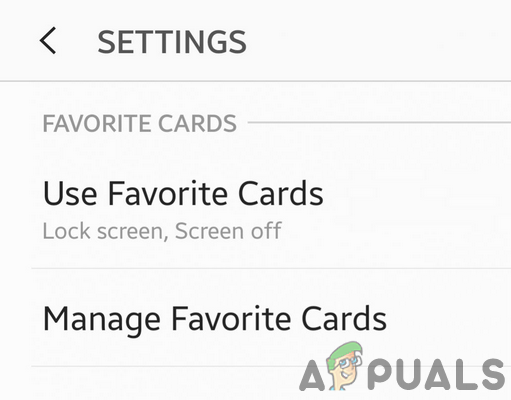
Manage Favorite Cards - Then select one of the cards as your favorite and then check if Samsung Pay is working fine.
Solution 7: Disable NFC in the Phone’s Settings
Samsung Pay supports MST (Magnetic Secure Transmission) and NFC (Near Field Communication) type of transactions. But the transaction will fail if your phone tries to use NFC mode (which is auto-enabled) on an MST terminal and thus cause the error under discussion. In this case, disabling NFC during the payment process may solve the problem.
- Launch the Settings of your phone and open Connections or More Networks.
- Now select NFC and then disable it.
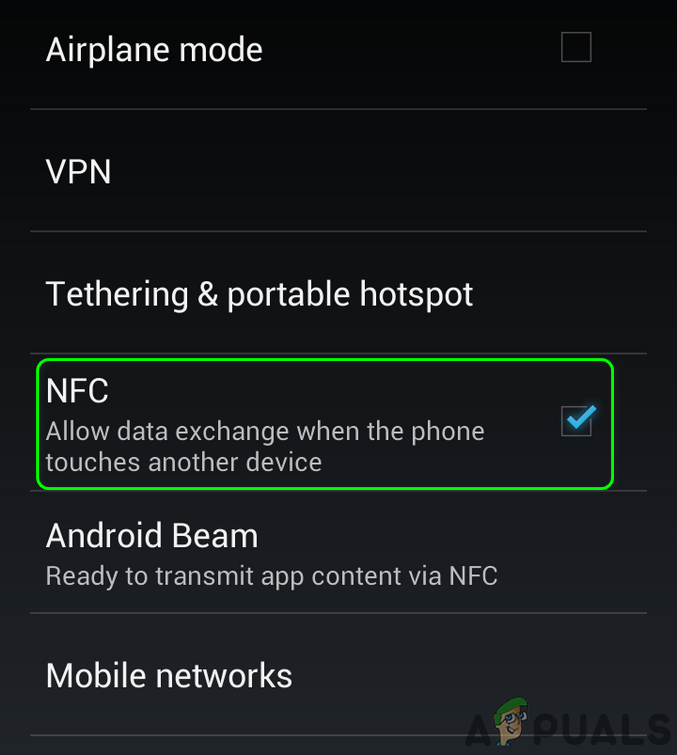
Disable NFC - Then check if you can make the payment through the Samsung Pay. If NFC pops up at the time of payment, then disable it and check if the issue is resolved.
If the issue persists, then test if MST is working fine by following the steps below:
- Open the Dialer of your phone and key-in the following code:
*#0*#

Dial *#0*# - Now, in the diagnostic menu, select MST Test.
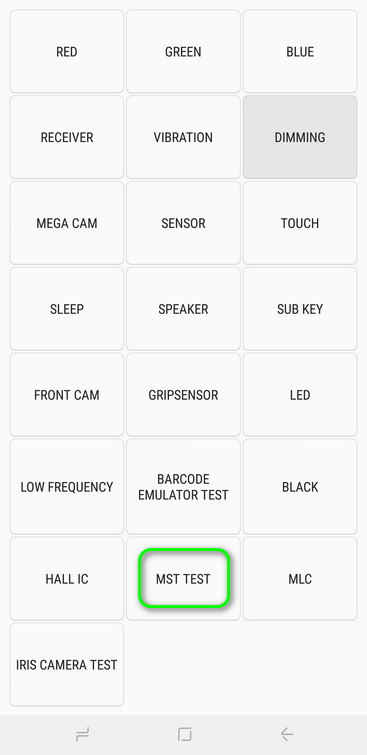
Select MST Test - Then, under Continuous, tap on Track 1+2 and bring the camera of your phone near to your ear to check if you can hear the buzzing/beeping sound of MST. If so, then MST is working fine and if you cannot hear the sound, then MST is not working and you should bring your phone to a repair shop.
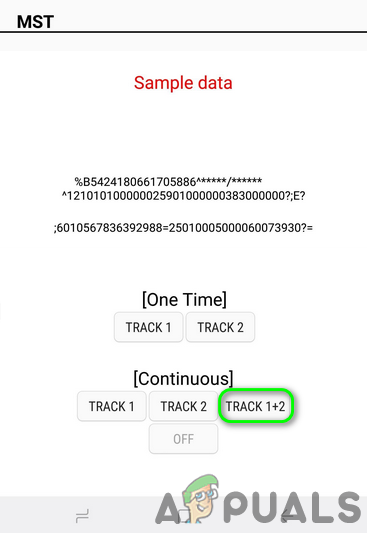
Select Track 1+2
Solution 8: Clear the Cache and Data of the Samsung Pay Application
The Samsung Pay uses a cache to boost up performance and improve the user experience. The application may not work if the cache itself is corrupt. In this context, clearing the cache and data of the Samsung Pay application may solve the problem.
- Open the Settings of your smartphone and then tap on Apps or Application Manager.
- Now select Samsung Pay and then tap on the Force Stop button.
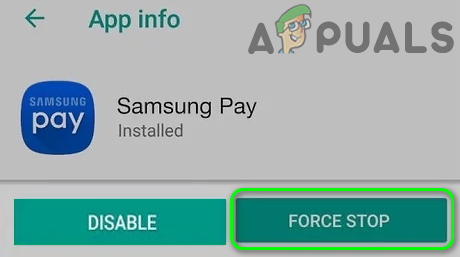
Force Stop the Samsung Pay - Then confirm to Force Stop the application and check if the Samsung Pay is working fine.
- If not, repeat steps 1 to 3 and open Storage.
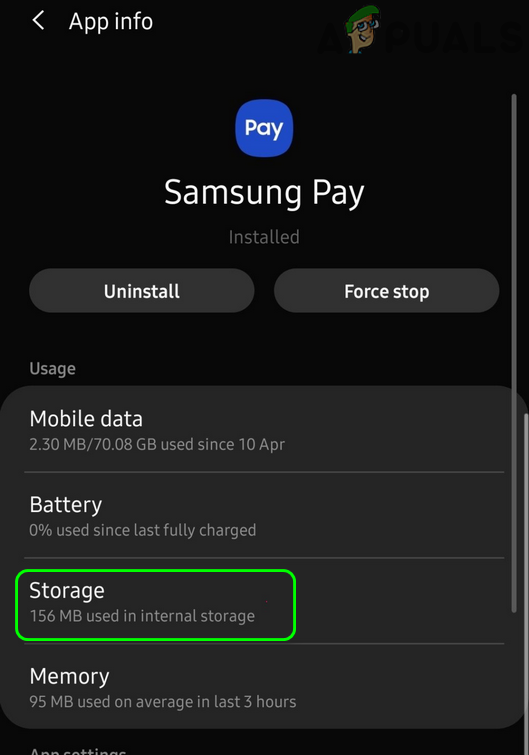
Open Storage Settings for Samsung Pay - Now tap on the Clear Cache button and then tap on the Clear Data button.
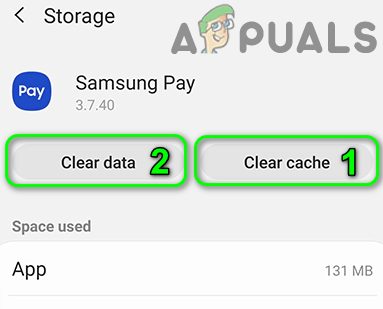
Clear Cache and Data of Samsung Pay - Then confirm to clear the data of the Samsung Pay application.
- Now launch the Samsung Pay and check if it is working fine.
- If not, repeat the above-mentioned steps to clear the cache and data of the Samsung Pay Framework.
- Then launch Samsung Pay and check if it is clear of the error.
Solution 9: Re-enable Permissions of the Samsung Pay
In the recent versions of Android, Google has implemented tons of features to improve the safety and security of its users. One such feature is the requirement of permissions to access certain features like storage, location, etc. The Samsung Pay application may not work if its permissions are not properly configured. In this case, re-enabling the permissions of the Samsung Pay application may solve the problem.
- Exit the Samsung Pay and force close it (as discussed in solution 8).
- Launch the Settings of your phone and open Apps or Application Manager.
- Now select Samsung Pay and then open Permissions.
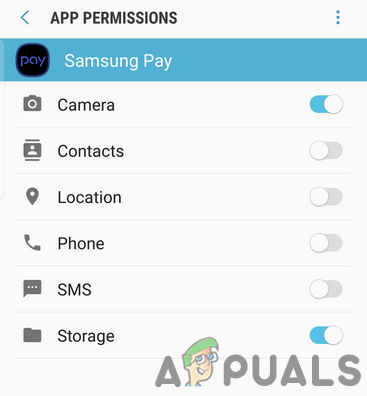
Disable Permissions of Samsung Pay - Then disable every permission by toggling the respective switch to the off position.
- Now, launch the Samsung Pay and give every permission it asks for.
- After enabling the permissions, check if Samsung Pay is operating normally.
- If not, then repeat solution 8 to clear the cache and data of Samsung Pay and then repeat the steps mentioned above to check if the issue is resolved.
Solution 10: Reset Your Phone to the Factory Defaults
If the issue is still not resolved, even after trying the solutions mentioned above, then the issue at hand is a result of the corrupt OS of your phone. In this context, resetting your phone to the factory defaults may solve the problem. But keep in mind that this process cannot be undone, so, proceed at your own risk.
- Backup the essential data of your phone and charge your phone to 100%.
- Now insert a SIM card of Samsung Pay supported country like the USA.
- Then, launch the Settings of your phone and open Backup & Reset.
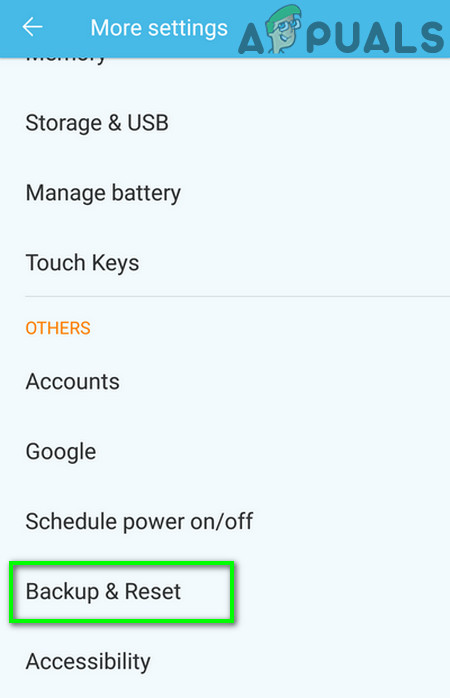
Tap on Backup and Reset - Then tap on the Factory Data Reset button and tap on the Reset Device button.
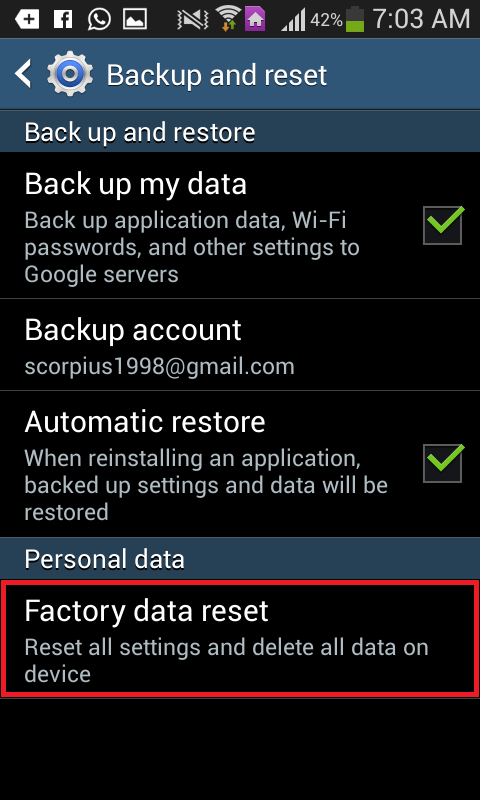
Factory Data Reset - Now, wait for the completion of the reset process. Do not power off or remove the battery of your phone during the reset process.
- Now, install & launch Samsung Pay (do not install Google Pay) and hopefully, the Samsung Pay issue is resolved.
If nothing has worked for you, then you can try APK of Samsung Pay and Samsung Pay Framework of the country of your phone (strictly not recommended). You can also download Good Lock from Galaxy Store and then within the Good Lock application, download Task Changer to check if the issue is resolved.




